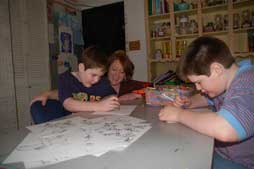By Sarah McVean/photo editor
(Final in a four-part series celebrating the 30th anniversary of the Women in New Roles program.)

When Laura Wright decided to go to college, she had no idea how it would affect her many roles.
More than anything, Wright praises the Women in New Roles program on South Campus for helping her manage her life as a mother of three, a co-director of a non-profit organization, an artist and a college student.
Last fall Wright became a part of TCC’s WINR program and is pursuing a degree in art on SE Campus. Wright’s main interest is mostly in painting, but she also loves drawing and photography.
She wants to become an art therapist, which also would benefit her with the non-profit organization she helped start called The Artism Project to help families like hers with autistic children.
“The WINR classes are nice because they are in the evening and were easy to work around my schedule,” she said. “The program is about learning about yourself and being able to apply that information into a successful career.”
Wright said the program is good for self-discovery.
“I learned so much about myself and things I would be good at,” she said. “It was very interesting. I truly enjoyed it. It was great to be able to bond with all different ages and walks of life.”
Wright said women in the WINR program included one who had just graduated high school and one who was just about to retire.
“It was just great how all these women were able to get together and learn,” she said.
The WINR program started on South Campus and is now offered on SE and NE campuses as well. Along with earning credits in human relations and applied psychology with a career focus, women also receive help with guided practice interviews and resume writing. This training helps reestablish confidence and skills that can help point them in the right direction of a career.
After a semester in the program, the confidence and career paths built, women can then branch into their specialty areas.
College is a family affair in the Wright household. Wright’s oldest son, Sean, is currently a student at TCC.
“I have a 20-year-old son, so I got married very young, and I didn’t go to college. I got divorced and got remarried and had Duncan and Graham. I home-schooled my oldest through high school, and the younger boys up until two years ago,” she said.
When Sean got out of high school, Wright told him how important it was to get a college education.
“I kept pressuring him, ‘You have to go to college, you have to go to college,’ she said. “That made me start to think that I should do that myself.”
Wright said she and Sean have a great relationship. They actually went to the first day of orientation together.
“He doesn’t care that he has his mom there. He is proud of me. He is just excited for me,” she said. “I can bring home a paper from school, and he’ll say ‘Wow, I’m so proud of you, Mom; you did so great.’ That is so encouraging to me.”
Her youngest sons, Graham, 9, and Duncan, 11, are autistic. They were her inspiration to help start The Artism Project.
“Duncan was non-verbal just a couple of years ago. Now he’s a chatterbox. When we bought this house, I was painting murals in his room of Thomas the Train, his favorite,” she said. “At one point, Duncan went and got his Thomas book and held it up to the wall. That was the first time he really asked me for something. That was a creative form of communication I received from him.”
Wright said art programs are very limited in public school, even more so if a child is not mainstreamed.
Wright received help with the idea for the project from her friend Bridgette Brady, who also has an autistic child. From there, they branched out to more mothers with autistic children.
“Bridgette had the name artism, and I came up with the logo. I then started filing paperwork, creating the Web site and starting a business. I became bogged down in the I can’t,” she said. “During the WINR program, I started to feel as though I could do this and make it work. It takes having people believe in you and supporting you to help you feel that you can accomplish your goals. That is what the WINR class did for me.”
The mission of Wright’s dream, her project, is to create a safe encouraging environment where autistic children can express themselves through art.
The project started in 2006, but it has really started taking off this year, Wright said.
